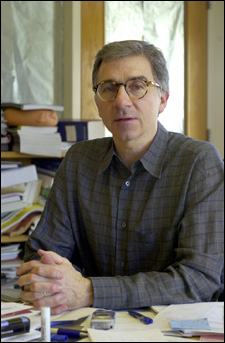Doug Melton to chair Life Sciences Council
Will direct development of life sciences in Faculty of Arts and Sciences

Douglas A. Melton, the Thomas Dudley Cabot Professor of the Natural Sciences in
the Faculty of Arts and Sciences (FAS) and co-director of the Harvard Stem Cell Institute, has agreed to serve as chair of the FAS Life Sciences Council, effective June 1.
In this new capacity, Melton will direct development of the life sciences in the FAS and coordinate with Harvard Medical School (HMS) and the Harvard School of Public Health (HSPH) on University-wide teaching and research initiatives.
“Doug Melton is a great scientist and a great scientific leader. I look forward to all that he will contribute in this new position, to the University’s efforts in the life sciences,” said President Lawrence H. Summers.
“This is an exciting time for the life sciences, and I am delighted that Doug Melton will help chart our path as we plan our growth in this key area,” said William C. Kirby, dean of the FAS and Edith and Benjamin Geisinger Professor of History. “With Doug’s leadership and vision, we will build a more cohesive and effective life sciences program here in the FAS, and indeed, across the entire University.”
Melton’s new role is an expansion of the tasks he has undertaken since last year as chair of the Life Sciences Executive Committee, which focused on ways to advance collaborative work and strengthen core facilities in the life sciences. That panel’s successor, the Life Sciences Council, will continue to work with the life sciences faculty to recruit new faculty, improve the undergraduate curriculum, develop new graduate programs in collaboration with the Division of Engineering and Applied Sciences (DEAS), HMS, and HSPH, and encourage joint and collaborative funding proposals by the life sciences elements of the FAS and the University.
“Over the past year the chairs of the life science departments and I have been given significant authority to work across departmental boundaries to improve our teaching and research,” Melton said. “This format that we have used in the Life Sciences Executive Committee has proved to be a successful one. The members of the Life Sciences Council and I look forward to continuing our work in the future.”
Melton will continue to pursue his own ambitious research program. He began his career as a developmental biologist studying the frog Xenopus laevis, but over the past several years has shifted his research focus to embryonic stem cells. Melton’s recent work – including the derivation of 17 new human embryonic stem cell lines for use by researchers worldwide – has made him a luminary in the nascent field of stem cell biology.
A member of the National Academy of Science and the American Academy of Arts and Sciences, Melton joined the Harvard faculty in 1981, has served since 1994 as a Howard Hughes Medical Institute investigator, and is affiliated with Children’s Hospital and Massachusetts General Hospital. He has served as an editor of numerous refereed journals, including Science, the Proceedings of the National Academy of Science, Development, and Neurobiology. He holds undergraduate degrees from the University of Illinois, Urbana-Champaign, and Cambridge University, and a Ph.D. in molecular biology from Trinity College and MRC Laboratory of Molecular Biology at Cambridge University.




